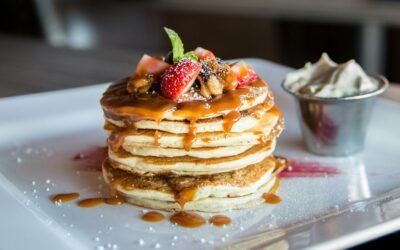If you landed on this blog by Googling “foods to avoid if you have acne”, chances are you’re hoping for a easy little list you can screenshot and live by. I get it, I’ve been there. But what if there’s a way that you can actually eat all the foods you love, and keep your skin clear?
I’m a nutritional therapist, and on my own skin journey I’d tried every diet going. I cut out carbs, chocolate, sugar, alcohol, gluten, dairy… even went fully plant-based at one point. And when clients first come to see me, their story often sounds pretty similar.
But guess what? In most cases, their skin still isn’t behaving. Even when they’ve cut out all of those foods. So if you’re wondering what foods make acne worse, or whether things like eggs or chocolate cause acne, let’s unpack what the science (and clinical experience) actually suggests, and why the constant cutting out of foods might be doing more harm than good.
What Does the Research Say About Foods That Make Acne Worse?
When it comes to acne and diet, the conversation online often makes you think there are loads of foods that have been proven to cause acne. But when you look at what the research consistently highlights, there are only a few dietary patterns and foods that have actually been researched:
Does dairy cause acne?
Some studies suggest a link between dairy consumption (especially skimmed milk) and acne. It’s thought to be due to dairy’s influence on certain hormones, like IGF-1, which can increase sebum production and inflammation in the skin. That said, it’s not a problem for everyone, I actually wrote more about dairy here.
High glycaemic index (GI) foods & acne breakouts
Foods that cause spikes in blood sugar, like white bread, sweets, sugary drinks, may increase hormones which then worsen acne in some individuals. Western-style diets have also been mentioned in studies. This includes diets high in ultra-processed foods, with low intake of fruits, vegetables, wholegrains and healthy fats. It’s not about one specific ingredient, but rather the combined effect of inflammation, poor gut health, and blood sugar imbalances.
What about eggs, chocolate and peanuts?
There’s a very small study involving cacao suggesting it might affect acne, but it was done on just 14 participants taking cacao powder as a supplement. It’s far too limited to draw any useful conclusions.
And for those wondering do eggs cause acne? Do peanuts make acne worse? The short answer is no. There’s no solid evidence to link eggs, peanuts, or soy to acne in the general population. The only time I see these foods possibly making skin worse is if someone has a food intolerance to them. But unless you have a true intolerance, they won’t be the ’cause’ of your acne. All of them are actually full of health benefits. These myths often circulate through social media rather than coming from reliable research and practitioners.
Why Do We Cut Out Foods in the First Place?
In clinical practice, nutritional therapists sometimes recommend removing certain foods temporarily to see if symptoms improve, it’s sometimes known as an elimination-style diet. The idea is to reduce potential triggers, let the body settle, and then reintroduce foods one at a time to try and highlight any food reactions.
But outside of a clinical setting, most people are cutting out foods because of fear. Fear of breakouts, fear of losing control of their skin, fear that if they don’t control their diet perfectly, their skin will spiral.
And that’s where it starts to go wrong.
From years of working with clients with acne, I’ve noticed a pattern:
- People cut out foods and never add them back in.
What starts as removing dairy turns into cutting gluten, then sugar, then soy, until you’re left with a handful of “safe” foods and a long list of things you avoid. - The focus becomes all about what to remove.
Instead of asking what you can add to support your skin, like increasing fibre, antioxidants, healthy fats, and essential nutrients, the conversation is dominated by restriction. Clients will often ask me ‘what else should I remove to help my skin?’ - Other root causes get ignored.
Acne isn’t just about food. It’s also about gut health, hormones, stress, nutrient status, and skin barrier function. You can cut out as many foods that make acne ‘worse’ as you like, but if you’re not addressing the other factors, you’re unlikely to see lasting improvements.
What I’ve Learnt as a Nutritional Therapist (and Through My Own Acne Journey)
After years of healing my own skin, and helping others do the same, here’s what I’ve learnt about removing foods to try and help your skin.
1. Stress Can Trigger Breakouts More Than the Food Itself
When you label foods as “acne-causing,” eating them can trigger anxiety and guilt. This stress response can then affect your gut and skin, triggering both gut and skin symptoms, even when the food itself isn’t a problem.
2. ‘Free-From’ Alternatives Aren’t Always Healthier
A gluten-free, dairy-free, sugar-free, vegan dessert isn’t automatically better for your skin. Many of these alternatives are highly processed and packed with additives that can disrupt the gut (and not give you many nutrients that your skin actually needs to heal). Often, a natural, whole food option containing the original ingredient would be a better choice.
3. Gut Health Might Be Driving Your Reactions
If your gut isn’t functioning well, you’re more likely to be sensitive to foods. Issues like low stomach acid, imbalanced gut bacteria, or increased intestinal permeability (also known as ‘leaky gut’) can lead to reactions you might mistakenly blame on specific foods. In these cases, working on gut health can allow you to reintroduce foods you thought you couldn’t tolerate. I’ve managed to help many clients reintroduce foods that were causing symptoms before, but now they fully tolerate them. It’s genuinely life-changing. Please note this doesn’t work with true allergies though.
A quick note on some of the acne nutrition advice you see online.
If you’ve come across people claiming “eggs cause acne because they’re full of progesterone” or “peanuts increase androgens and trigger breakouts” please, I beg you, ask them where they got that information. I’ve yet to see any reliable research to back these claims, and a lot of advice shared online is either misunderstood or completely made up.
And I get the irony here, I’m writing a blog online too, so how do you know you can trust me? I guess you don’t have to, as I’m just sharing my opinion and clinical experience.
But, as a registered nutritional therapist, my recommendations are based on evidence, clinical experience, and continuous professional development. I did actually used to believe that gluten and dairy were huge triggers for skin issues, and most of us should avoid. But as I’ve worked with clients, learnt more about gut healing, and testing options have improved greatly, I’ve realised there is so much we can do to support our gut, skin and stress. Which allows us to reintroduce foods we thought we could never eat again. I also encourage you to question what you read (including from me) and to look for reputable sources or practitioners with recognised qualifications and relevant expertise.
Most of what circulates online is regurgitated information from blogs, TikTok and other random sources that nobody bothers to fact-check. While it’s true that some people have genuine food allergies or intolerances, when it comes to foods causing acne, it’s rarely as simple as ‘this one ingredient causes breakouts’.
If it was, we’d all have flawless skin by now because we’d just follow this list of foods to avoid and our skin would be happy and healthy.
So, Are There Any Foods to Avoid If You Have Acne?
Instead of fixating on individual foods, it’s more useful to look at your overall dietary pattern. A diet consistently high in ultra-processed, high-sugar, and low whole foods is likely to cause problems, not just for your skin but for your gut, hormones, and overall health.
Here’s what I suggest focusing on:
- Limit your intake of highly processed foods
- Prioritise nutrient-dense, whole foods (think fruits, vegetables etc).
But if you need some help, Six Weeks to Skin Confidence is my online course that teaches you all the basics for healthy skin. Or, if you’re eating well and still breaking out, 1:1 sessions with the options for testing and supplements might be the best option for you.





0 Comments